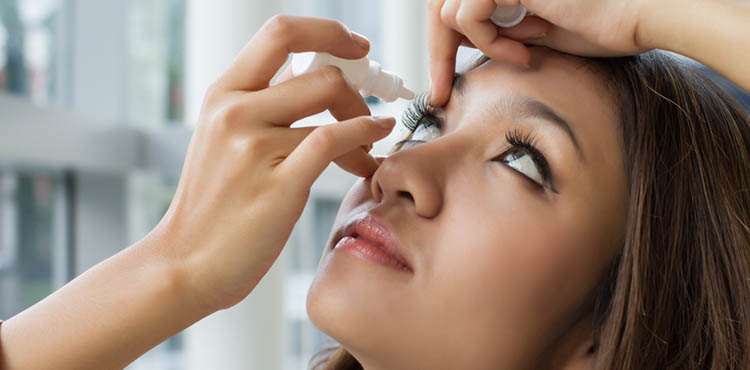Seasonal allergies are a fact of life for many people throughout the US. An estimated 7.8% of the adult population suffers from allergic rhinitis, more commonly known as hay fever.
The Midwest states, including our beloved Missouri, experience a huge increase in the amount of airborne pollen during the spring months. These allergies may not be limited to your sinuses and throat — they can cause many other symptoms, including skin rashes, inner ear issues, digestive upset and even eye problems.

An Eye on Allergies
Do you find yourself waking up in the morning to itchy, swollen eyes? While there are many conditions that can lead to this, if it’s happening to you mainly during the spring months, it’s possible you’re suffering from seasonal allergies.
When allergic rhinitis is afoot, many people will notice a wide variety of hay fever symptoms, including a runny nose, congestion, scratchy throat or widespread skin itching and irritation.
Some also notice their eyes are itchy, feel “gritty” or are prone to watering excessively. They may even feel or appear red or swollen.
Identifying the Culprit
Eye irritation can be brought on by many different problems. Everything from injuries to contact with substances can contribute to a high level of discomfort that shouldn’t be ignored.
It’s important to make sure you know exactly what you’re dealing with — conditions such as a scratched cornea, eye infections, and even “dry eye” share some of the same symptoms.
Getting a definitive diagnosis from your general practitioner or eye care specialist can help clear up any confusion and get you on the way to receiving the best treatment available.
What You Can Do For Eye Allergies
If it’s determined that you are suffering from seasonal allergies, there are a number of things you can do to help keep your eyes from becoming swollen or feeling itchy, gritty or painful.
Allergy Testing. If your doctor feels it would be helpful to know what you’re allergic to, he or she can refer you for allergy testing. Once the chief irritants are identified, you can better avoid situations where you might come in contact with the allergens. Another option is to receive immunotherapy, which pinpoints and helps your body “ignore” the allergens.
Antihistamine Eye Drops. If you are suffering from mild allergies, treating the symptoms might be enough to get you through the blooming season. There are both over-the-counter and prescription eyedrops that contain antihistamines. Antihistamines block the body’s over-zealous reaction to allergens, keeping the puffy eyes and sniffling to a minimum.
Shower and wash your hair every evening. This may seem strange, but when you shower you remove the majority of pollen that may have accumulated on your skin, clothing, and in your hair over the course of the day.
Cool compresses. Making a cool compress with a clean, soft cloth soaked in cool water can bring relief to itchy, swollen eyes. A study also found it enhanced some eye treatments. The best part is it’s free and very soothing!
Saline Eye Drops. If you find yourself out and about a lot, toss a small bottle of saline eye drops into your pocket or bag. Use these drops regularly throughout the day to help flush pollen from your eyes. This will decrease the amount of time it is in contact with your eyes, and thus, lessen the reaction the pollen can cause.
You don’t have to dread allergy season any longer! With the proper treatments, you can enjoy the spring and summer with bright, clear eyes.
Posted May 7, 2018 by Silverstein Eye Centers